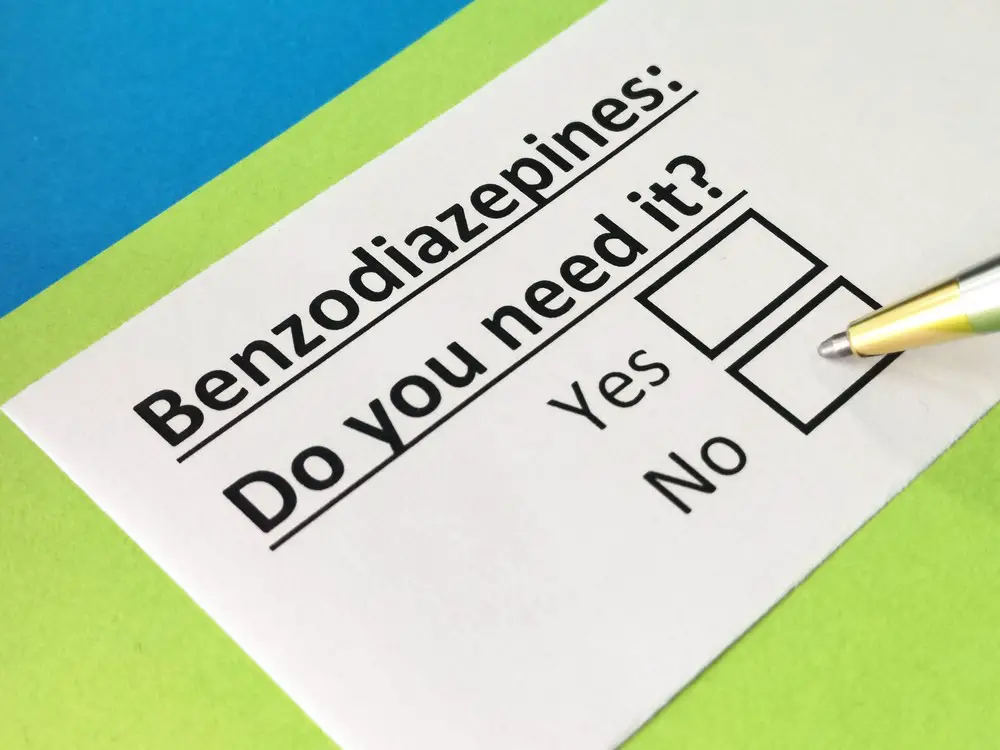As a BetterHelp affiliate, we receive compensation from BetterHelp if you purchase products or services through the links provided
• Clonazepam may be more sedating than Lorazepam.
• Lorazepam interacts with fewer drugs than Clonazepam.
• Overdose risk is higher for Clonazepam than Lorazepam.
• Side effects are similar but may appear quicker with Clonazepam.
• Alternatives to both drugs exist and should be discussed with a doctor.
Clonazepam and lorazepam are both benzodiazepines, medications that can be used to treat anxiety and panic disorders. Both drugs have similar effects on the brain, but there are some critical differences between them. Therefore, before deciding on your mental health treatment, it is essential to understand the differences between Clonazepam and lorazepam.
Table of Contents:
What are Clonazepam and Lorazepam?
Clonazepam and Lorazepam are both benzodiazepines, a type of medication used to treat anxiety, panic attacks, seizures, and insomnia. They work by increasing the activity of gamma-aminobutyric acid (GABA), a neurotransmitter in the brain that helps regulate mood.
Clonazepam is also known as Klonopin or Rivotril, while Lorazepam is also known as Ativan. Both medications are available in pill form and can be taken orally or intravenously, depending on the severity of the symptoms being treated.
The main difference between Clonazepam and Lorazepam is their duration of action; Clonazepam has a longer half-life than Lorazepam which means it stays active in the body for extended periods. This makes it more effective at treating long-term conditions such as chronic anxiety or insomnia but can also increase the risk of side effects if not taken correctly.
Side Effects:
Common side effects of both medications include drowsiness, dizziness, confusion, impaired coordination/balance issues, nausea/vomiting, blurred vision, and changes in appetite or weight gain/loss. In addition, in rare cases, they may cause depression or suicidal thoughts, so monitoring your mental health closely when taking either medication is essential.
It is essential to inform your doctor of any other medications you are taking before beginning treatment with either Clonazepam or Lorazepam, as they can interact with certain drugs such as antidepressants and anticonvulsants. This could lead to severe complications, including an increased risk of overdose or even death, if not monitored carefully by your healthcare provider.
Overdose Risk:
Taking too much of either drug can result in an overdose which can be fatal without medical intervention. Hence, it’s essential to take them exactly as your doctor prescribes and never exceed recommended doses. If you think someone overdoses on either medication, seek emergency medical help immediately.
Clonazepam and Lorazepam are both anti-anxiety medications that can be used to treat mental health issues, but they have some crucial differences. So let’s take a closer look at how these two drugs differ.
How do Clonazepam and Lorazepam Differ?
Clonazepam and lorazepam are both benzodiazepines, a type of medication used to treat anxiety disorders. They work by increasing the amount of GABA (gamma-aminobutyric acid) in the brain, a neurotransmitter that helps regulate mood and behavior. While they have similar effects on the body, there are some critical differences between them.
Duration:
Clonazepam has a longer half-life than lorazepam, meaning it stays in your system for more time after taking it. This can be beneficial if you need long-term relief from anxiety symptoms but can also increase your risk of dependence or addiction if not taken as prescribed. Lorazepam has a shorter half-life, so its effects wear off more quickly and may require more frequent dosing to maintain symptom control over time.
Side Effects:
Both medications can cause side effects such as dizziness, confusion, memory problems, coordination issues, and sleep disturbances; however, Clonazepam tends to cause more sedation than lorazepam due to its longer duration of action Additionally, Clonazepam may lead to increased appetite, while lorazepam may decrease appetite levels.
Drug Interactions:
Clonazepam is known to interact with other drugs, such as antidepressants or antihistamines, potentially leading to an overdose if taken together without medical supervision. Lorazepam does not typically interact with other medications. However, it should be monitored closely when combined with other substances like alcohol or illicit drugs since these combinations can still result in dangerous side effects or overdoses, even when taken alone at therapeutic doses.
As mentioned above, both medications carry an increased risk for overdose when mixed with certain substances, including alcohol or opioids; however, Clonazepam has an additional risk due to its long half-life. This makes it easier for someone who takes too much accidentally (or intentionally) to become dangerously sedated before they realize what is happening and seek help. In contrast, lorazepam’s shorter duration makes it less likely that someone will experience this kind of severe reaction before seeking medical attention.
If you’re looking for alternative treatments for anxiety, many options are available depending on your individual needs, including cognitive behavioral therapy, exercise, relaxation techniques, yoga, and mindfulness meditation. Talk therapy is often recommended as a first-line treatment option because, unlike medication, it doesn’t come with any potential risks associated with drug interactions or overdosing.
Clonazepam and Lorazepam have different effects on the body, so it is essential to understand how they differ before taking either. Next, we will look at the potential side effects of each medication.
Side Effects
They work by slowing down the central nervous system to reduce symptoms. However, while these medications can be effective in treating specific conditions, they also come with potential side effects that should be considered before taking them.
Drowsiness is one of the most common side effects of Clonazepam and lorazepam. This may make it difficult for people to stay awake during the day or concentrate on the tasks at hand. It’s important to note that this drowsiness can increase when alcohol or other drugs are taken along with either medication.
Confusion is another possible side effect of Clonazepam and lorazepam. People may not think clearly or remember things easily while taking either drug. Memory problems have also been reported, which could lead to difficulty recalling conversations or events from recent days or weeks prior.
Coordination problems have also been linked to Clonazepam and lorazepam use; people may feel unsteady on their feet while walking or experience trouble performing simple motor skills like writing their names correctly on paper without making mistakes. Additionally, changes in sex drive or ability have been reported by a small percentage of users of these medications as well; men might find it harder than usual to get an erection, while women might experience decreased libido levels compared to normal functioning without any medication present in their systems at all times.
When taking Clonazepam or lorazepam, you must speak with your doctor about any side effects you may experience. These drugs are generally well tolerated, and side effects usually go away after a few days. To reduce the chances of experiencing side effects, your doctor may recommend starting with a low dose and gradually increasing it over time. Additionally, drinking plenty of water can help flush out the drug from your system more quickly, which can also help lessen some side effects.
Now let’s move on to discuss drug interactions.
Drug Interactions
It is essential to know the potential drug interactions that can occur when taking either Clonazepam or lorazepam.
Drugs like antidepressants or anticonvulsants may interact with Clonazepam or lorazepam in a way that could increase the risk of side effects. Therefore it is essential to tell your doctor about all medications you are taking before starting either drug. For example, take an antidepressant such as Prozac (fluoxetine) and Clonazepam or lorazepam. It could lead to increased drowsiness and confusion due to their combined soothing effect on the body.
It’s also important to be aware of any over-the-counter medications you may be taking while using either drug, as they, too, can interact with each other in ways that could cause adverse reactions such as dizziness, nausea, headache, et. This includes herbal supplements like St John’s Wort which should not be taken alongside benzodiazepines due to their ability to decrease their effectiveness by speeding up the metabolism rate within the body.
Therefore, discussing with your doctor all medications you are taking before starting either drug is essential. Additionally, alcohol consumption should be avoided while using Clonazepam or lorazepam since alcohol has been known to increase the sedative effects of these drugs, making them more likely to trigger an overdose. Thus, always make sure you talk openly with your doctor about any concerns regarding drug interactions before beginning treatment so they can guide how best to manage this issue safely and effectively.
It is essential to be aware of potential drug interactions when taking Clonazepam or lorazepam, as these can have serious consequences. Now let’s look at the risks associated with overdosing on either medication.
Conditions Treated by Klonopin and Ativan
Clonazepam / Klonopin and Ativan / Lorazepam are two medications the FDA has approved to treat various conditions. Klonop n is prescribed to treat seizures, including akinetic and myoclonic seizures and those resulting from Lennox-Gastaut syndrome. It can also be used off-label for other anxiety disorders, such as a social phobia. Ativan is primarily used to treat severe forms of seizure called status epilepticus, but it can also be used off-label for treating anxiety or depression-related anxiety.
Both drugs are commonly prescribed to help with symptoms of anxiety and panic attacks. In addition, some doctors may prescribe Klonopin off-label for sleeping problems, while Ativan has been approved by the FDA specifically for insomnia treatment. Other ses include treating alcohol withdrawal and agitation when these symptoms become too difficult to manage without medication intervention.
When considering taking either drug, you must talk with your doctor about any potential side effects or interactions with other medications you may be taking before starting treatment. Additi nally, both drugs should only be taken under medical supervision since they can cause dependence if misused or abused over time. With p oper use, though, these medications can relieve many mental health issues, so don’t hesitate to discuss them with your healthcare provider if you think they could benefit you.
Klonopin Vs. Ativan Side Effects, Dosage & Pregnancy Safety Information
When considering Klonopin vs. Ativan side effects, it is essential to note that they may vary depending on individual factors such as age and medical history. It i also possible for these medications to cause dependence with long-term use, so it’s important to talk with your doctor about any concerns you have before taking them.
In terms of dosage information for Klonopin vs. Ativan: For adults over 18 years old who are being treated for panic disorder or seizure prevention, the recommended starting dose is 0.25 mg twice daily for Klonopin and 2mg once daily for Ativan; however, this may vary depending on individual needs so always follow your doctor’s instructions when taking either medication.
Finally, regarding pregnancy safety information:
Klonopin and Ativan should not be taken during pregnancy due to the risk of birth defects; however, if you become pregnant while taking either medication, speak with your doctor immediately, as stopping suddenly could lead to withdrawal symptoms which can be dangerous in pregnant women.
Overdose Risk
What is an Overdose?
An overdose occurs when someone takes too much of a drug or medication. It can be intentional or accidental, and it can have serious consequences. Symptoms of an overdose vary depending on the type of drug taken but may include confusion, slurred speech, slowed breathing, unconsciousness, seizures, and even death.
Clonazepam & Lorazepam Overdoses
Clonazepam and lorazepam are both benzodiazepines that are commonly prescribed to treat anxiety disorders. They work by slowing down the central nervous system, which helps reduce symptoms like panic attacks and insomnia. However, taking too much clonazepam or lorazepam can lead to an overdose which can be fatal if not treated immediately. Sympt ms of a clonazepam or lorazepam overdose may include extreme drowsiness, shallow breathing, loss of coordination, and coma.
Prevention & Treatment
The best way to prevent an overdose is to take only as prescribed by your doctor and never share your medication with anyone else. If you think you may have taken too much clonazepam or lorazepam, seek medical attention, as this could save your life. Treat ent for a clonazepam or lorazepam overdose usually involves supportive care, such as oxygen therapy and intravenous fluids to stabilize vital signs until the effects wear off over time. In so e cases, if necessary, medications such as flumazenil (an anti-seizure medicine) may also be used to control seizures caused by the overdose.
It is essential to be aware of the potential risks of taking Clonazepam and lorazepam, including overdose. Next, we will discuss alternatives to these medications.
Alternatives
When it comes to mental health, medication is not the only option. Clonazepam and lorazepam are commonly prescribed medications for anxiety, but some alternatives may be more suitable for you.
Selective serotonin reuptake inhibitors (SSRIs) such as sertraline (Zoloft), fluoxetine (Prozac), and paroxetine (Paxil) are a type of antidepressant often used to treat depression and anxiety disorders. SSRIs work by increasing levels of serotonin in the brain, which can help improve mood and reduce anxiety symptoms.
Serotonin-norepinephrine reuptake inhibitors (SNRIs) such as venlafaxine (Effexor XR) or duloxetine (Cymbalta) also increase levels of serotonin in the brain. Still, they also boost norepinephrine levels, aiding focus and concentration while diminishing feelings of fatigue associated with depression or anxiety.
Before making any treatment options, you must talk to your doctor about what might be best for you based on your needs and medical history. Cognitive behavioral therapy can help people identify negative thought patterns that lead to anxious behavior, so they can learn how to manage their emotions better without relying on medication alone. This type of therapy focuses on changing behaviors rather than just treating symptoms like other forms of treatment do.
FAQs
Is lorazepam as strong as clonazepam?
No, lorazepam is not as strong as clonazepam. Lorazepam is a benzodiazepine with sedative and hypnotic effects, while Clonazepam is a stronger benzodiazepine with more powerful anticonvulsant and muscle relaxant properties. The d sage of lorazepam needed to achieve the same effect Clonazepam would be higher than the recommended dose for either drug. As such, it’s generally considered safer to use clonazepam instead of lorazepam.
Is Klonopin or lorazepam stronger?
Klonopin / Clonazepam is generally considered the stronger of the two medications. It has a longer half-life than lorazepam, meaning it stays in your system for longer and can have more powerful effects on anxiety and other mental health issues. Klono in also has a higher potency, which means that smaller doses are needed to achieve similar results as larger doses of lorazepam. However, both medications should only be taken under the guidance of a doctor or healthcare professional.
What’s the difference between Clonazepam and Ativan?
Clonazepam and Ativan are both benzodiazepines, which are a type of medication used to treat anxiety, panic attacks, seizures, and insomnia. The main difference between the two is that clonazepam has a longer half-life than Ativan. This means it takes longer for clonazepam to be metabolized by the body and therefore stays in your system for longer. Clonazepam is typically prescribed at lower doses than Ativan due to its long-lasting effects. Both medications can cause drowsiness or dizziness, so caution should be taken when taking either one.
Which Benzo is the best for anxiety?
There is no one best benzodiazepine for anxiety, as the proper medication depends on individual needs and preferences. Generally, short-acting drugs such as lorazepam or alprazolam are used to treat acute anxiety symptoms, while longer-acting medications like Clonazepam may be better suited for chronic anxiety. Your doctor can help you decide which medicine is best for your particular situation based on factors such as the severity of symptoms, medical history, and other medications you may be taking.
Conclusion
When it comes to clonazepam vs. lorazepam, both medications can be effective in treating mental health issues. However, they have different side effects and drug interactions that must be considered before starting either medication. Discu sing the risks and benefits of each with your doctor before deciding which one is right for you is essential. Alternative treatments are available if neither medication seems a good fit for you. Ultimately, it’s up to you and your healthcare provider to decide what works best for your needs.
- Breaking the Silence: Why Men’s Mental Health Matters More Than Ever - April 15, 2025
- How to Transform a Home’s Patio Space into a Relaxing Space - March 23, 2025
- 5 Strategies to Use a Cell Phone to Help Manage Your Stress - March 23, 2025
This site contains affiliate links to products. We will receive a commission for purchases made through these links.










